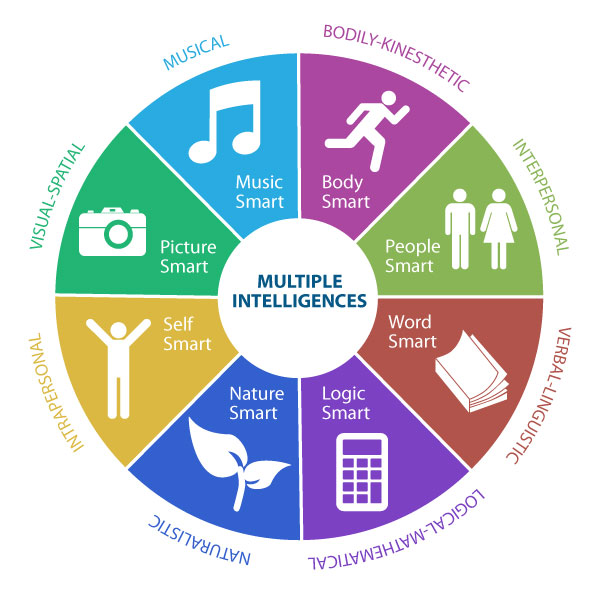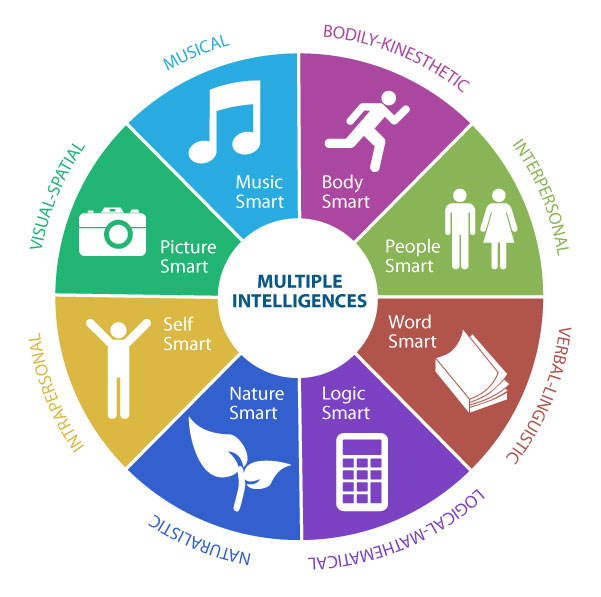Different types of intelligence play to certain strengths

A chart of the different types of intelligence.
It’s not uncommon to hear students talking about how difficult or easy their major is. In fact, most students who aren’t engineering or nursing majors often feel guilt admitting any sort of difficulty in their classes. Some of this may stem from the fact that these programs are particularly difficult, but it is also a result of the types of intelligence society and the NDSU community seem to value.
In total, there are nine different types of recognized intelligence. Some of these tie in very well to what most people would recognize as the traits of an ‘intelligent’ person, such as logical and mathematical reasoning; however, few people would look at an individual with good spatial reasoning or great coordination as being particularly intelligent.
When intelligent people come to mind they usually have traits such as intense memory recall, a vast array of knowledge or a specialty in a math or science field. It is no wonder then that musical theater or English students fear being reprimanded for complaining about classes which use skills that don’t fit under the umbrella of what most people consider intelligent traits.
Not only is it time for students at NDSU to realize that intelligence comes in more than one form, but for educators to consider whether or not their teaching styles are fully measuring the vast array of skills students have. Consider the following intelligences and how they should change the current definition of intelligence:
Spatial
Those with high spatial intelligence are skillful at visualizing the world in their mind. They are able to look at something and manipulate it and change it in their mind. Those with high spatial intelligence often excel in fields such as architecture, engineering, science and art.
Few people are born with high spatial intelligence, it is often a learned skill which has to be practiced.
Naturalist
Those with high naturalist intelligence have a good understanding of living things and their relationship to them. They are often able to feel highly connected to their environment and can easily connect and empathize with animals. Those with high naturalist intelligence may be interested in the fields of biology, zookeeping, veterinary care or botany.
People with this type of intelligence often have great concern for environmental issues and a genuine interest in learning about nature. Additionally, these people are more likely to feel deeply connected to nature when outdoors.
Musical
Those with high musical intelligence are skilled at listening to sounds in order to identify pitch, tone and rhythm. Those with this intelligence may be able to compose, perform or genuinely appreciate music. They are often drawn to disciplines such as performing arts, musical theater, music performance and acting.
Those with this kind of intelligence are often very perceptive to sound and can easily distinguish between different types of sound.
Logical-mathematical
The skills garnered by those with high logical-mathematical intelligence are often the ones most easily associated with the general view people hold of intelligence. Individuals with high logical-mathematical intelligence are able to determine and quantify figures and are interested in making predictions and proving them.
Individuals high in logical-mathematical intelligence are drawn towards engineering, accounting, mathematics, medicine and science. Developing logical-mathematical intelligence often involves practicing rational and objective thinking towards proposed problems.
Existential
Those with high existential-intelligence excel at asking the larger question that surrounds human life, including the purpose and meaning of human existence. These individuals look at the bigger picture and attempt to capture the meaning from said picture. People with existential intelligence excel in the fields of philosophy, sociology, religious studies and social justice work.
Interpersonal
Those with high interpersonal intelligence can easily pick up on other people’s feelings, emotions and driving forces. They have a quick reaction rate to social input and are often very good on their feet in new or unexpected situations. Individuals with this kind of intelligence often do very well as actors, politicians, lawyers and religious leaders.
Growing interpersonal skills involves being highly perceptive to social cues and the reactions of others.
Bodily-kinesthetic
Those high in bodily-kinesthetic intelligence are very good at coordinating their body and their mind. These are often the most coordinated and fit individuals. They appreciate both helping their body excel and treating it with the utmost respect. Individuals with high bodily-kinesthetic intelligence are drawn to the fields of athletics, dietetics, physical therapy or civic occupations.
Linguistic
People who are skilled in regards to linguistic intelligence are very good at finding the right words to express themselves. They find ease in putting words to their thoughts and the thoughts of others. Those with linguistic intelligence may be authors, journalists or teachers.
Linguistic intelligence is often a skill built up over time, not inherently given to a person.
Intrapersonal
Those with high intrapersonal intelligence are skilled in understanding their own emotions, as well as their needs and wants. These individuals are highly connected to themselves and are able to verbalize and work towards what they need. Individuals with this kind of intelligence may be drawn towards social work, psychology, theology and philosophy.
Why this matters
More than just a lighthearted way to recognize our own personal intelligences, it’s essential to bring the application of multiple intelligences to the table when considering education. Too often students complain about how they’re ‘not smart’ because they struggle in an introductory math class. However, most students who do poorly in art classes or struggle in finding friends would insist they too are ‘not smart.’
Intelligence, as society currently sees it, seems to be more a measure of how skilled at test-taking and fact recall a person is, rather than practical and diverse applications of skills. Sure, you can say an engineering course is difficult or the nursing program is highly competitive, but that doesn’t mean that the art program isn’t extremely difficult or that that skills used for social work don’t push a person mentally.
We cannot measure intelligence on a scale of one to ten, it is instead a spectrum.
